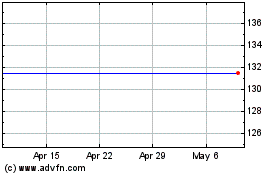If Tiffany Gets Left at the Altar, It Will Need a Web Strategy
September 09 2020 - 5:18PM
Dow Jones News
By Suzanne Kapner
Tiffany & Co. bet on tourists flocking to its flagship city
stores to pay a premium for its jewelry, making it an attractive
takeover target to a luxury giant. Now, with tourism decimated due
to the coronavirus pandemic and LVMH trying to back out of the
deal, the jeweler faces the prospect of reinventing itself in a
brave new retail world.
Tiffany got just 6% of its sales from e-commerce in each of the
last three fiscal years. That figure shot to 15% for the six months
to July 31, a period when its stores were temporarily closed due to
the health crisis. Still, analysts say Tiffany is playing catch-up
on the digital front at a time when consumers, nervous about
visiting physical stores, are shifting more of their purchases
online.
A union still might happen. Tiffany has filed a lawsuit in
Delaware to compel LVMH Moët Hennessy Louis Vuitton SE to either
complete their marriage or pay damages. The owner of Louis Vuitton
and Fendi said it no longer wanted to buy Tiffany because the deal
was being dragged into the middle of trade disputes between France
and the Trump administration.
If Tiffany were to remain independent, it would fare better than
other luxury chains that have been upended by the pandemic. Unlike
Neiman Marcus Group Inc., which filed for bankruptcy in May, the
jeweler doesn't have excessive debt or a history of losses.
Tiffany, which had $4.4 billion in revenue last year, had about
$400 million in net debt as of the end of July.
Tiffany will need to reboot in a landscape vastly different from
the one of spring 2019, when it began an ambitious renovation of
its iconic store on Manhattan's Fifth Avenue. Tiffany doesn't break
out sales from tourists, but analysts say the location relies
heavily on foreign and domestic visitors. Even local residents are
venturing out to stores less, as health concerns persist.
The pandemic poses specific challenges to a luxury retailer like
Tiffany since many of the items it sells are occasion based. Some
couples postponed weddings during the lockdown. Many wealthy
households have shifted their spending to home improvements,
including adding pools, as they work from home and spend less on
travel or entertainment. Tiffany said sales of engagement jewelry
fell to $343 million in the first six months of the current fiscal
year, down from $557 million a year earlier.
"Luxury is about being seen wearing certain products, including
jewelry, " said Neil Saunders, a managing director of research firm
GlobalData PLC. "As people stay home more, the need for purchasing
these items has dissipated."
Analysts said Tiffany can succeed as an independent company, and
may even attract other suitors down the line. But if the deal falls
through, "they will not benefit from the firepower of being owned
by the largest holding company in the luxury space," said Erwan
Rambourg, the co-head of global consumer and retail research at
HSBC.
One rationale for LVMH's initial interest in Tiffany was to
accelerate a turnaround that was already under way. Tiffany ousted
its chief executive in 2017 and replaced him with former Diesel
boss Alessandro Bogliolo to modernize the 183-year-old jeweler. Mr.
Bogliolo had previously spent 16 years at Bulgari, the jeweler that
LVMH acquired in 2011.
Under Mr. Bogliolo, Tiffany hired actress Elle Fanning to star
in ads designed to appeal to younger shoppers. The company also set
about updating stores, including its Manhattan location, which it
had occupied since 1940 and had been immortalized in the film
"Breakfast at Tiffany's" starring Audrey Hepburn. It also was
building stores in several Chinese cities, looking to tap into the
country's rising middle class.
Tiffany overhauled its U.S. and Chinese websites last year,
which enabled it to quickly boost online sales during the
pandemic.
LVMH executives had viewed Tiffany as a "sleeping beauty," a
brand with great promise, but one that hadn't fully realized its
potential, according to people familiar with the situation. The
French conglomerate made an unsolicited approach to buy the U.S.
company, ultimately agreeing to pay $16.3 billion in cash.
LVMH planned to increase marketing at Tiffany and provide more
money to fast track its strategy, which included launching more new
products, upgrading boutiques and making the brand more appealing
to millennials, the people said.
Then the pandemic hit, and Tiffany's sales fell 45% to $556
million for the three months ended April 30, when most stores were
closed. The company swung to a $64.6 million loss in the
period.
While business improved in the most recent period, sales and
profits are still below year-ago levels, falling 29% in the three
months to July 31. The company returned to a profit of $31.9
million, driven by a surge in online spending and a rebound in
China. But that is well below the $136.3 million earned in the same
year-earlier period.
Tiffany has since reopened most of its stores and said sales
trends improved in August. The company has predicted higher profits
in the holiday quarter than a year ago, but it will be entering a
holiday season unlike any other.
Write to Suzanne Kapner at Suzanne.Kapner@wsj.com
(END) Dow Jones Newswires
September 09, 2020 17:03 ET (21:03 GMT)
Copyright (c) 2020 Dow Jones & Company, Inc.
Tiffany (NYSE:TIF)
Historical Stock Chart
From Mar 2024 to Apr 2024

Tiffany (NYSE:TIF)
Historical Stock Chart
From Apr 2023 to Apr 2024
